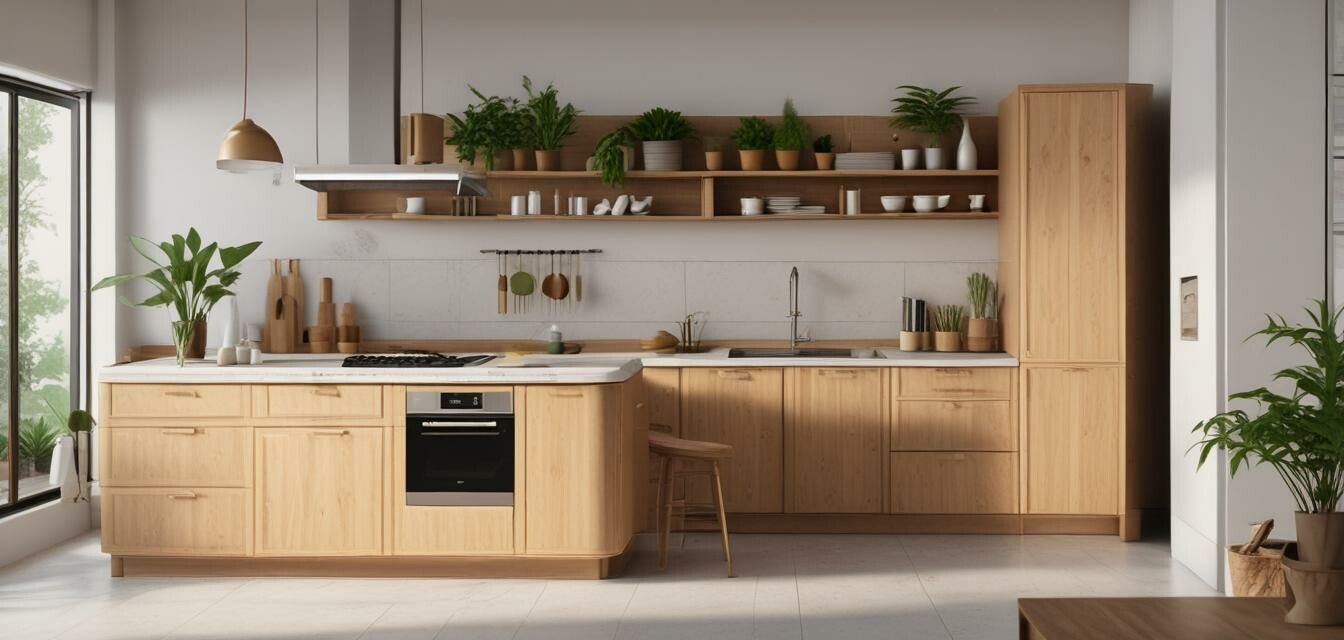
Essentials for Starting an Eco-Friendly Kitchen
- Emphasize sustainability: Choose kitchenware made from renewable materials.
- Minimize waste: Look for reusable and compostable options to reduce environmental impact.
- Prioritize energy efficiency: Integrate energy-efficient appliances to save energy and costs.
- Utilize versatile tools: Invest in multi-functional kitchenware for maximum utility and minimum waste.
If you're looking to create a kitchen that not only meets your cooking needs but also aligns with eco-friendly practices, this guide is for you. Building an eco-friendly kitchen is about more than choosing the right ingredients. It involves selecting kitchenware that reflects your values while being functional. This article will provide you with a comprehensive guide to the must-have items that form the foundation of an eco-friendly kitchen.
1. Bamboo kitchenware
Bamboo kitchenware is becoming increasingly popular due to its sustainability and durability. Here are a few essential items:
- Bamboo cutting boards
- Bamboo utensils (spoons, spatulas, etc.)
- Bamboo bowls and serving dishes
Benefits of bamboo kitchenware
- Renewable resource
- Biodegradable and compostable
- Lightweight and sturdy
2. Compostable kitchen tools
Opting for compostable kitchen tools is a great way to minimize waste. These tools break down naturally, making them environmentally friendly.
| Compostable Tool | Material | Usage |
|---|---|---|
| Plates | Sugarcane | Serving meals |
| Cups | Palm leaves | Holding liquids |
| Cutlery | PLA (Polylactic Acid) | Eatin or serving food |
Why choose compostable tools?
- Helps in reducing landfill waste
- Contributes to a circular economy
- Safe for plants and soil
3. Eco-friendly storage solutions
Using eco-friendly storage solutions ensures that your kitchen remains organized while being mindful of the environment. Consider the following:
- Reusable glass containers
- Stainless steel storage jars
- Bamboo storage baskets
Advantages of eco-friendly storage
- Reduces plastic waste
- Promotes food preservation
- Durable and long-lasting
4. Energy-efficient appliances
Investing in energy-efficient appliances is essential for minimizing your kitchen's carbon footprint. Look for appliances with high energy ratings:
- Refrigerators
- Ovens
- Dishwashers
Benefits of energy-efficient appliances
- Reduced energy consumption
- Lower utility bills
- Less wear on the environment
5. Reusable produce bags
Replacing single-use plastic bags with reusable produce bags is a simple yet impactful choice:
- Made from organic cotton or recycled materials
- Helps reduce plastic waste
- Washable and long-lasting
6. Reusable silicone products
Consider integrating reusable silicone products into your kitchen:
- Silicone lids
- Silicone baking mats
- Silicone storage bags
Advantages of reusable silicone products
- Durable and flexible
- Suitable for microwave and dishwasher use
- Helps eliminate single-use plastics
7. Stainless steel kitchen essentials
Stainless steel is a sustainable choice that offers durability and functionality. Consider:
- Stainless steel cookware
- Reusable water bottles
- Stainless steel straws
Why choose stainless steel?
- Recyclable at end of life
- Long-lasting and sturdy
- Non-reactive with food
Tips for building your eco-friendly kitchen
- Start small: Gradually replace existing items with eco-friendly alternatives.
- Research materials: Understand the sustainability of different materials to make informed choices.
- Support local brands: Look for locally produced eco-friendly kitchenware to reduce carbon footprints.
Pros
- Promotes sustainability and environmental responsibility.
- Can save money in the long run through energy-efficient options.
- Healthier choices can lead to better cooking practices and food storage.
Cons
- Eco-friendly kitchenware may have a higher upfront cost.
- Availability may be limited depending on location.
- Some products may require special care (e.g., handwashing).
Conclusion
Starting your eco-friendly kitchen journey is an exciting and rewarding initiative. By choosing sustainable kitchenware, you can create a space that aligns with your eco-conscious values while enjoying the benefits of reduced waste and improved health. Remember, every small step counts, and with these essentials, you're well on your way to a greener kitchen. Explore more about bamboo kitchenware, compostable kitchen tools, and other eco-friendly options to continue enhancing your sustainable kitchen.
For more tips and guidance on eco-friendly kitchenware, check out our other articles in the Buying Guides category.



